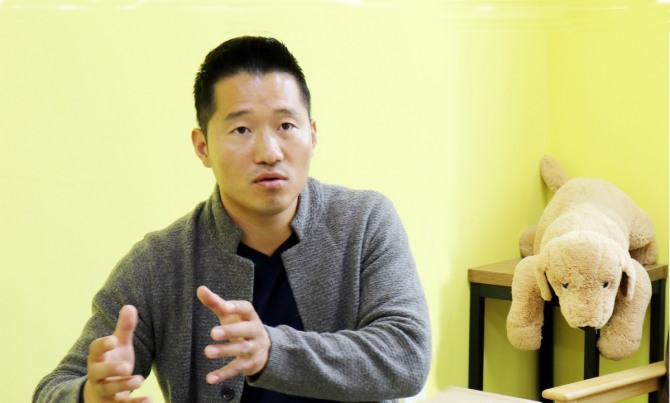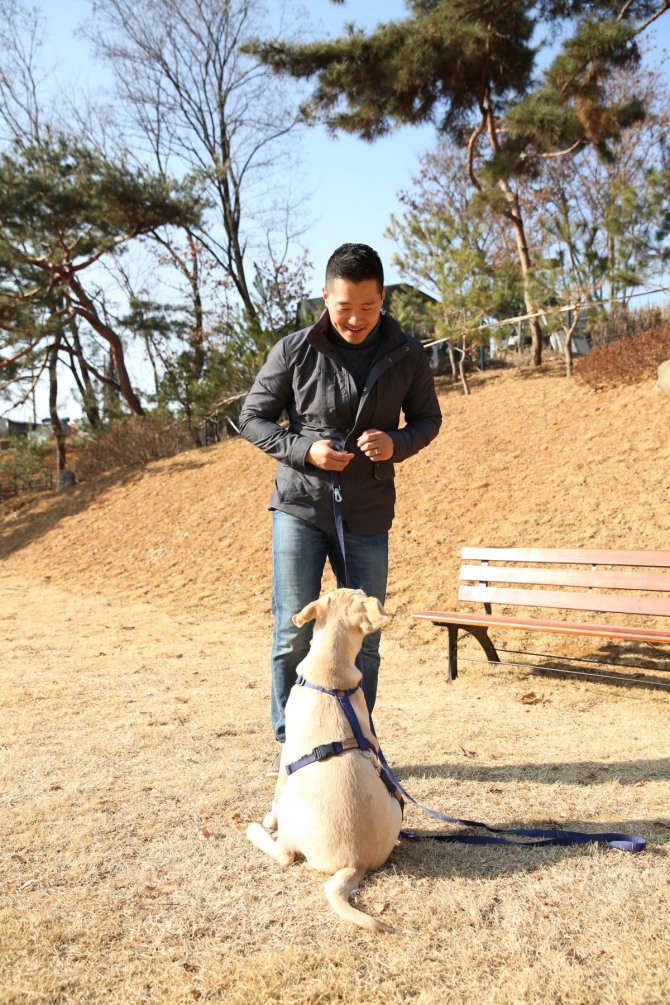From son of dog breeder to ‘president of dogs’
Star pet trainer Kang Hyung-wook talks of life, relations with dogs, pet culture in South Korea
As a kid, Kang Hyung-wook was a rather unusual boy. Rather than playing with his peers, he preferred spending time with dogs.
Born to a dog breeder father, his main interest during his formative years never strayed from the furry animal, he said.
“I do not know, maybe it was my rebellious phase against parents that all boys would go through at that age, or maybe it was just me,” Kang, now a sought-after dog trainer, said at his company, Bodeum Training Center, in Namyangju, Gyeonggi Province.
“What I know for sure is that I just loved dogs, and wanted to change things for them,” the 32-year-old star dog trainer said.
Whatever it was, it seems to have led him to the right place.
 |
| Kang Hyung-wook speaks during an interview at his office in Bodeum Company in Namyangju, Gyeonggi Province. Park Ju-young/The KoreaHerald |
Kang, as the face of the TV show, is enjoying wild popularity. Mesmerized by his magical work of taming the behavior of troublesome dogs, he has earned the nickname “President of Dogs.”
But beyond fame and popularity, Kang sees a role for himself to play in South Korea’s complicated relations with dogs.
With 4 million pet dogs and a thriving pet industry, South Korea may qualify for the label of being a dog-loving nation.
But under the surface, many are at a loss with their new-found love for dogs as a companion animal, not livestock as they have traditionally been seen. Irresponsible pet owners failing to put their dogs on a leash or muzzle them, resulting in dog bite attacks, are making headlines recently, while some owners seriously worry about their dog suffering depression because of their busy city life.
As for misbehaving dogs, Kang said the attitude of dog owners is often the key to resolving the problems.
“What many pet owners overlook is that dogs are living things with their own desires and principles, just like humans. So if we respect them as they are and provide what they want, they will also respect us,” Kang said. “Once you provide what your pet wants, you should explain it what you want, in a way that dogs can understand.”
It isn’t as simple as it may sound. It wasn’t for Kang, either.
At age 20, after adolescence as a fervent dog lover, he traveled foreign countries to learn dog training techniques across the world and develop his own skills.
He first went to Australia, then Norway and Japan, with just a list of dog training centers and trainers to learn about different training methods.
Recapping his experiences here and abroad, he said pet cultures varied across countries. For example, he never had to do toilet training in Western countries, though it is considered a very basic skill for dogs here.
“It may be due to the differences in housing style, but really, it is about the lifestyle and the attitude toward your dog as a family member,” Kang said.
 |
| Kang Hyung-wook with a dog (Bodeum Company) |
“I think the definition of good dogs in Korea should be changed. Before, and still now, the definition is that dogs should be brought up to obey their owners. I think in a way it reflects how people have defined what makes a person ‘good’, in society in the past.”
Kang said that the current life patterns of people living in urban areas has greatly influenced the pet culture in Korea.
“We are more than adapted to a fast lifestyle. From making reservations and changing our smartphones to building relationships with others, it is all done so quickly. Similarly, I see some people buy dogs at a moment’s urge and give up and abandon them just as quickly as they had adopted them,” Kang said, noting the social problem of abandoned dogs.
The number of stray dogs in the country is increasing annually, recording some 62,700 in 2016, up 9.3 percent on-year, according to the Agriculture Ministry.
Citing that there were no shelters for abandoned dogs in Norway because there were no stray dogs, Kang said the process of buying and adopting dogs in South Korea should be stricter.
Owning a dog is not for everyone, stressed Kang, who authored the book “You Should Not Adopt a Dog.”
His principle when it comes to dogs, after all these years, is to treat dogs as dogs, not like humans. In other words, treating dogs with expensive delicacies, toy products and services may not be the best thing for them.
“From my experiences from both here and abroad, I realized that the best way to raise dogs and live with them is to build relationship and trust. You can never order a dog to be relaxed, right?”
As for how he wants to contribute to the pet culture in Korea, he said it would be getting rid of the culture of raising and killing dogs for meat.
During his childhood, Kang used to go to Moran Market near his hometown to take pictures of the caged dogs waiting to be slaughtered and sold for meat and report them, Kang said. Moran Market, a traditional street market located in Seongnam, Gyeonggi Province, is still one of the biggest dog meat markets in South Korea, but the slaughterhouses inside were closed in February.
“If my efforts work to reduce the number of dogs sold for meat, it would be very meaningful to me. When you hit a dog, you say it is violence against animals. When one kills a dog for meat, they don’t call it a crime,” Kang explained. “I believe that when society can draw out a consensus that dogs should not be eaten, it will also bring voices advocating rights of other animals, such as chickens and cows as well.”
By Jo He-rim (herim@heraldcorp.com)




























